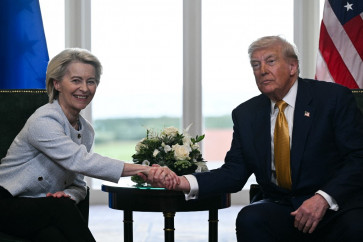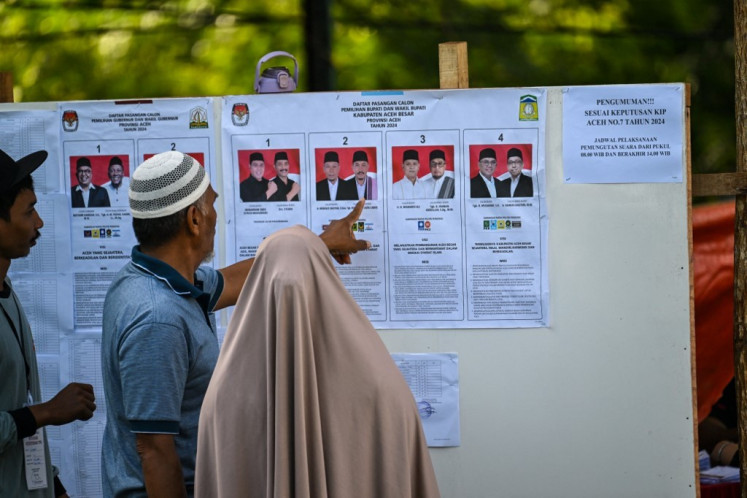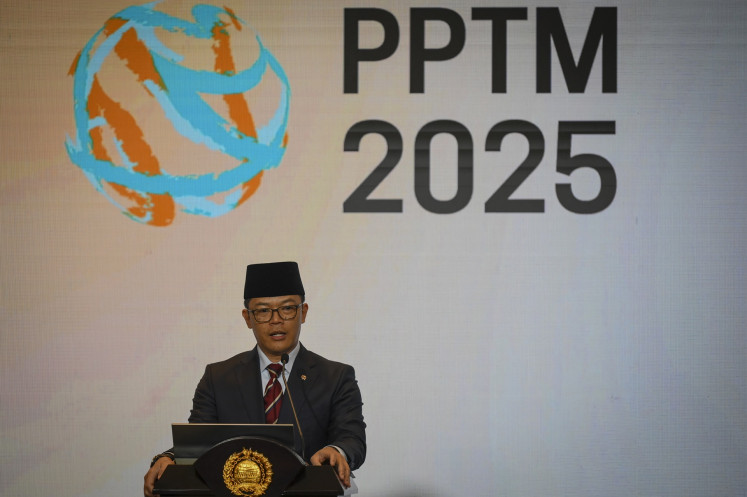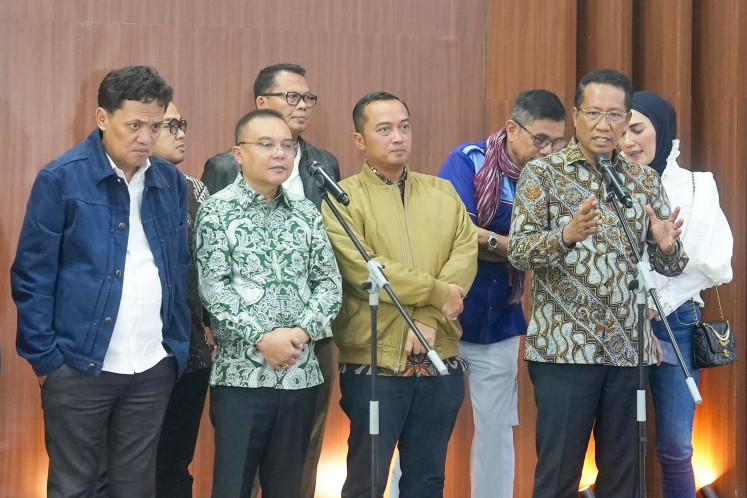Popular Reads
Top Results
Can't find what you're looking for?
View all search resultsPopular Reads
Top Results
Can't find what you're looking for?
View all search resultsParwati Surjaudaja: The value of planning and people's engagement
With more than 20 years of managerial experience, including nearly five years as president director and CEO of publicly listed PT OCBC NISP, Parwati Surjaudaja knows that two things are key to success
Change text size
Gift Premium Articles
to Anyone
W
ith more than 20 years of managerial experience, including nearly five years as president director and CEO of publicly listed PT OCBC NISP, Parwati Surjaudaja knows that two things are key to success.
'It is a matter of planning and time management. If we plan well, 80 percent will go (as planned),' said the former chairperson of the Indonesian Students Association in the United States.
And for those who still consider gender an issue, the 48-year-old mother of four said there was no problem with Indonesian women holding executive positions while also being mothers.
Citing the conclusions of a conference on women, she said Indonesian women were more fortunate in terms of opportunities in leadership positions compared to other Asian countries, such as Japan and South Korea.
'However, I have often found that Indonesian women limit themselves because of perceived Asian values in which women should perform their role as a mother. Many stop working after giving birth. Actually, they can manage both responsibilities because they have staff and help at home. These days, with advanced electronic gadgets, it's so much easier (to manage people) [...] so there is no excuse,' said the recipient of World Young Business Achiever Award in 1996 and Indonesian Women Award in 2012.
According to her, the ability to listen and observe are the qualities that most female leaders have even though this does not necessarily mean that male leaders do not share them. 'We are used to listening and observing, this is our advantage,' she said.
Parwati had her first managerial posting at Bank NISP in 1990 as director and continued to advance in her career, even though in the beginning, as she acknowledged, working at a bank was not her dream job.
She had assumed working at a bank was boring and routine.
'However, it turned out that working for a bank was incredibly dynamic and was by no means static in terms of regulation, financial and capital market, not only in Indonesia but also overseas; all of which have an impact on the banking sector,' she said.
Bank NISP was established in 1941 with its market confined to West Java. It changed its status from a private into a publicly listed bank in 1994. It was among the few banks that survived the financial crisis that hit Indonesia in 1998.
According to her, during the period of 2005-2010, there was much change in Indonesia's banking landscape marked by the emergence of new banks owned by foreign shareholders, and the attendant stiffer competition.
'So, creating change is not a matter of choice but a matter of survival. Really, it's very dynamic and challenging, which keeps me excited,' she said.
'Being a CEO, allows me to see the whole picture. In the past, I could only see things from my own perspective. But now I have to balance all of the stakeholders' concerns, fulfill customers' and employees' needs, make sure that regulators are happy with us and ensure our environment and surrounding community support us.'
Apart from planning, Parwati has also found the value of what she calls a 'democratic' management style that allows people to become engaged in the decision-making process because she believes this approach creates sustainability.
Making a decision in a dynamic and fast-changing banking industry could not just rely on one person given the diversity of information coming from the field, she said.
'In banking, things change quickly and everyone has to think independently. When you are open and democratic, the system runs more smoothly and you don't want to rely on one person to make a decision,' she said.
'Customers' demands, for instance, change from time to time, which needs a prompt and adequate response. With competition becoming stiffer, customers need the best service.'
The 'democratic' approach has greatly assisted her in performing day-to-day duties. 'Everyone is involved. They can provide ideas and solutions and therefore, I can listen more instead of having to think of the solution myself. People know the real issue and are more honest about what's happening on the ground and they are not afraid to say, 'hey, the decision is wrong, can we find another solution?'
'Because people are not afraid to be honest, the real cause of the problem can be resolved. This way, the bank can constantly improve,' she said.
People empowered
She said that the key to achieving success was people.
'It is very important to have the right team, people with the right capabilities and values. So, I guess as a CEO of a bank you never take credit because it's a team effort. You only try to balance things. But I guess I am lucky because I have the right team, with the right values and attitude,' she said.
Banking is a long-term business about trust, she said. 'Professionalism, Integrity and Customer focus (PIC) are values that NISP has retained since the bank was set up 72 years ago,' she noted.
Parwati acknowledged that quiet a few of people were accustomed to the bank's homey working environment, they reached a comfort zone and it's very challenging to ask people that have been working for 20 years to get out of the comfort zone.
'Sometimes it is very difficult to make a decision in regards to people. But we have to see it from a broader horizon for the long-term interest of the organization that has to continually grow. We give them new opportunities, training and responsibilities.
'In most cases, we solve the problem amicably. We always refer to the big family of the OCBC NISP and we treat them as family. For those who refuse to follow (a change), we try to find the reason, whether it's attitude or capability. If it is about attitude, then it's much easier because we know that there is another department where they will feel happier. But if it is a capability issue, we give them other responsibilities and so, we try to find a win-win solution,' she said.
Managerial issues that are also common in other companies include facing less motivated people.
She said that understanding the issue was crucial because it was about people with different problems, issues, interests, etc before finding the root cause in order to solve the problem in a sustainable manner. 'It could be that the job does not fit with his/her skills or aspirations, or it could be about pay or superiority. The priority is to solve the issue,' she said.
Through an employee engagement survey that NISP implements, 'We try to find out what most people are concerned about, whether it's about deal pay, working environment or difficult targets. When we find out what the issues are, in most cases we're able to solve the problem,' she said.
Experience
More than 20 years of experience working in Bank NISP. She started her managerial posting at NISP in 1990 as director for different areas, including audit, accounting & finance and human resources, in 1997-2008 a vice president for the area of accounting & finance, corporate planning, regional and HC & LD, and from 2008 to present a president director and CEO.
Previously she worked at SGV Utomo/Andersen Counsulting Jakarta Indonesia (1987-1997), with the last position as senior consultant.
Education
Bachelor of Science, Accounting and Finance, San Francisco State University, California, passing the exam with Cum Laude predicate (1985);
MBA, Accounting, San Francisco State University, California USA (1987);
Various system schools from Andersen Consulting, St. Charles, Illinois, USA; Bank Indonesia Leader Staff school, Jakarta (SESPIBI XVII, Jakarta) (1992).










